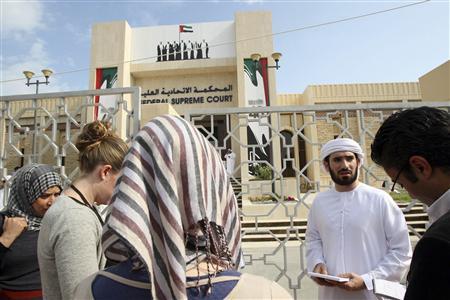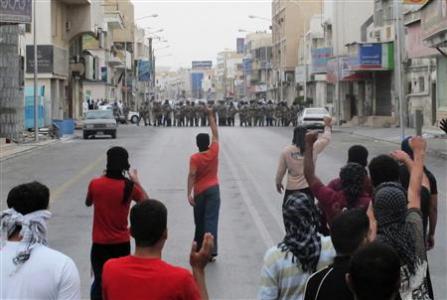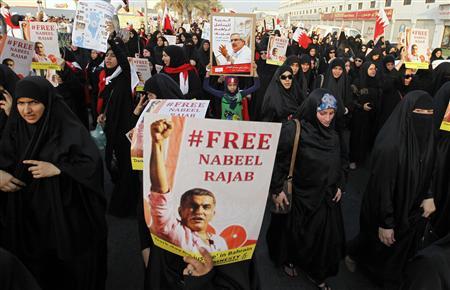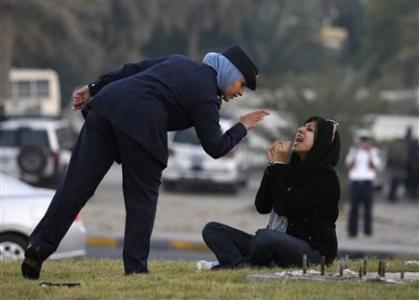www.aljazeerah.info
News, January 2013
Archives
Mission & Name
Conflict Terminology
Editorials
Gaza Holocaust
Gulf War
Isdood
Islam
News
News Photos
Opinion Editorials
US Foreign Policy (Dr. El-Najjar's Articles)
www.aljazeerah.info
|
Editorial Note: The following news reports are summaries from original sources. They may also include corrections of Arabic names and political terminology. Comments are in parentheses. |
Gulf Arab activists step up campaigns despite quiet crackdown
 |
 |
| Abu Dhabi, UAE | Qatif, Saudi Arabia |
 |
 |
| Budayia, Bahrain | Manama, Bahrain |
By Sami Aboudi
Wed Jan 16, 2013 12:44pm EST
DUBAI (Reuters) -
When security forces raided the home of one of his friends in eastern Saudi Arabia one day last August, Ali al-Fardan felt a net tightening around him.
"Dear friends, I think I am at risk," the 37-year-old activist, who uses a pseudonym to avoid arrest, wrote in a message to his email contacts.
"CID (state security) attacked one of my friends' homes last night over his support for me ..."
Although Fardan remains free, his fears are real and shared by dozens of human rights campaigners in Saudi Arabia and other Gulf Arab states who work largely behind the scenes to document alleged rights abuses or push for political or social reforms.
Like the activists themselves, the crackdowns in the U.S.-allied region may not make the top international headlines.
But rights groups say that in some ways they are just as harsh as elsewhere in the Middle East, and have intensified as critics, emboldened in the past two years by the Arab Spring uprisings, become more vocal.
Of particular concern to governments is the growing number of lawyers, journalists, teachers and other influential citizens who have been using modern social media tools to record events in areas that are hard for foreigners to reach.
Working discreetly under assumed names or publicly through existing but often unlicensed rights groups, many take risks by contacting what in some countries are regarded as "evildoers", "Zionist tools" or "instruments of amorality".
They email news flashes, reports, photos or video recordings to rights groups and international news organizations.
On paper, there is nothing that bars citizens in most Gulf states from freely speaking their minds.
But in reality, activists know that they put themselves at risk on charges of "tarnishing the reputation of the state" for being critical in public instead of taking grievances to the rulers, as is common in the Gulf's centuries-old tribal culture.
"Talking to the press is a red line," the campaigner who goes by the name of Fardan told Reuters in an interview conducted by email. "They will ban me from travelling abroad, and put me in jail for months, if not years."
Opposition to Gulf Arab governments comes from a variety of groups -- disgruntled Shi'ite Muslims alleging discrimination in many walks of life, Sunni Muslim unemployed youth demanding jobs, human rights and anti-corruption campaigners, liberals seeking a more open society and more accountable government and Islamists calling for stricter adherence to religion.
Despite these differing aims, the groups' acts of dissent incur similar consequences.
In Saudi Arabia, at least three people have been jailed for speaking to foreign media, activist Waleed Abu al-Khair said.
They include Khaled al-Johani, the only person to turn up for a "day of rage" called for by activists in March 2011 in the Saudi capital Riyadh, who was detained after he demanded political reforms in comments to the BBC. Johani was freed more than a year later.
Abu al-Khair said he faces charges himself for speaking to the Financial Times.
Saudi authorities and officials in other states in the six-member Gulf Cooperation Council deny targeting activists for human rights work but say that people who participate in illegal protests or foment unrest can be arrested.
Activists in other countries, including Qatar, Bahrain, Oman, Kuwait and the UAE, have faced government crackdowns and harassment in varying degrees, rights groups say.
Philip Luther, Amnesty International's director for the Middle East and Africa, said campaigners, especially those calling for reforms in Saudi Arabia, Bahrain and the UAE, face arbitrary travel bans without due process and with no time limit.
"In Bahrain opposition activists have had their nationalities stripped and in UAE a bidoon blogger was expelled from the country," Luther said. The term bidoon refers to stateless Arabs who live in several Gulf Arab states. UAE officials say he was expelled for security reasons.
ARAB SPRING
The response in the oil-producing Gulf has been sharp and perhaps ultimately more effective than in other parts of the Middle East partly because the authorities have moved swiftly to silence potential sources of criticism, and not just political dissidents, before they get out of control, activists say.
Many have rounded up activists and put them on trial. Others closed websites judged to be spreading "immoral" views or publishing news that does not conform to national culture, including the "Free Saudi Liberals", whose editor Raid Badawi was charged with cyber crime.
The UAE has shut down the office of the RAND Corporation, an official said in December, the latest Western research institute to be closed by the Gulf Arab state. Last March, it closed Germany's Konrad-Adenauer-Stiftung (KAS) and the U.S.-funded National Democratic Institute (NDI), citing licensing irregularities.
Surveillance of rights activists has turned into regular harassment and several activists have been brought to court.
"Before the Arab Spring, protests happened infrequently and arrests were for individuals," said an activist in Oman, where mass demonstrations over unemployment rocked the country in March 2011.
"Nowadays, the crackdown has increased many-fold," said the activist, who agreed to be interviewed but later asked not to be named for fear of government reprisals.
Oman denies cracking down on freedom of expression but says the country's laws prohibit criticism of the country's long-time ruler, Sultan Qaboos, and slander in general.
Saudi Arabia announced a $110 billion financial package to improve the lot of ordinary citizens but also banned protests and deployed National Guards to its Eastern Province where discontent among the country's Shi'ite Muslim minority erupted into protests in early 2011.
The kingdom portrayed the demonstrations as a national security issue, accusing Shi'ite Iran of fomenting the troubles, a charge Iran denies. Saudi Arabia took a similar line with Sunni activists demanding reforms elsewhere in the country.
SURVEILLANCE
Eager to avoid international criticism over their human rights record, authorities in the Gulf have sought to persuade activists to tone down their activities.
Mohammed al-Qahtani, one of 11 people on trial on charges of "implanting the seeds of sedition and division" and challenging officials, said interrogators have offered to drop charges against him if he agreed to apologize for his work and stop his activities.
"We are all under strict and close watch, but we don't mind because we work in public and we are not doing anything against the law," said Qahtani, co-founder of the Saudi Civil and Political Rights Association (ACPRA).
In the UAE, the crackdown focused on Islamists suspected of plotting to set up an Islamist state but also included liberal activists in its net.
Five activists among a group of some 130 people who signed a petition demanding reforms were arrested in April 2011 and charged with insulting the country's rulers. The UAE maintains that it was the insults that some members had directed at its leaders, rather than the petition, that prompted the arrests.
President Sheikh Khalifa bin Zayed al-Nahayan pardoned the five men soon after a court found them guilty, but rights campaigners said more was to come. Ahmed Mansoor, an outspoken activist who blogs about political reform, said he faced a "smear campaign" on social media and was twice assaulted by unknown assailants.
"After our case attracted massive international criticism, we thought things would be better and mistakes would not be repeated. We were wrong," said Mansoor, one of the five who were arrested, told Reuters. "We were shocked to see the citizenship of six (Islamists)... revoked without any trial or even adhering to the constitutional due process."
Other Gulf states have followed a similar pattern.
Qatar, which supported Arab Spring revolts, drew calls of hypocrisy in November when it jailed a poet who had praised the revolt against overthrown Tunisian President Zine al-Abidine Ben Ali.
The poet, Mohammed Ibn al-Dheeb al-Ajami, was imprisoned for life on charges of inciting the overthrow of the Qatari government by writing, "We are all Tunisia, in the face of the repressive elite", and insulting the country's absolute monarch by referring to "sheikhs playing on their Playstations".
Rights groups said that despite the crackdown, Gulf activists have grown more vocal since the Arab Spring protests began in 2011.
"There have been indications of greater solidarity work by activists on cases in Gulf countries other than their own," Amnesty International's Luther said. "The repression against activists has largely not silenced them."
(Additional reporting by Rania El Gamal; Editing by Mark Heinrich and Sonya Hepinstall)
Fair Use Notice
This site contains copyrighted material the
use of which has not always been specifically authorized by the copyright
owner. We are making such material available in our efforts to advance
understanding of environmental, political, human rights, economic,
democracy, scientific, and social justice issues, etc. We believe this
constitutes a 'fair use' of any such copyrighted material as provided for
in section 107 of the US Copyright Law. In accordance with Title 17 U.S.C.
Section 107, the material on this site is
distributed without profit to those
who have expressed a prior interest in receiving the included information
for research and educational purposes. For more information go to: http://www.law.cornell.edu/uscode/17/107.shtml.
If you wish to use copyrighted material from this site for purposes of
your own that go beyond 'fair use', you must obtain permission from the
copyright owner.
|
|
|
|
||
|
||||||


